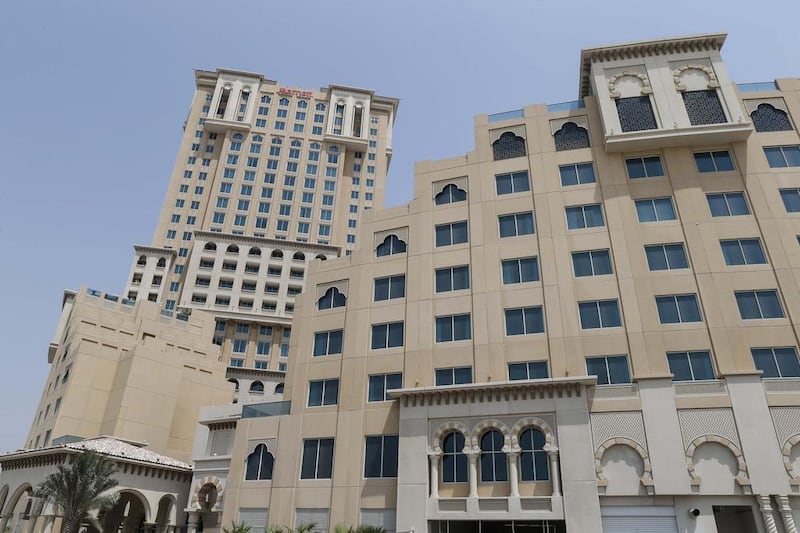A drive towards diversification of accommodation offerings for tourists in Dubai is attracting big-name developers to the booming hotel apartment sector. A government push for more mid-range accommodation has also contributed to the trend.
The number of tourists to the emirate showed year-on-year growth for the past four years following a recovery from the global financial crisis. In the first half of this year, 5.8 million tourists, up by 2.3 per cent, checked into Dubai's 88,680 rooms across 634 hotels and hotel apartments.
Hotel apartments account for 28 per cent of the room stock in Dubai, which has the highest concentration of such units in the UAE. There were 24,924 rooms from hotel apartments as of August, according to a Colliers study.
Also known as serviced apartments, these attract guests – often those accompanied by large families – looking for medium to long-term stays. The average length of stay at hotel apartments was 5.3 days last year, nearly the double at hotels.
The occupancy rate at serviced apartments last year reached 82 per cent, a year-on-year increase of 6.5 per cent. The average room rate was Dh433, which rose by 3.8 per cent on the previous year.
Hotels were more expensive at an average of Dh629 a night last year, showing a rise of 7 per cent on 2012, with an average occupancy rate of 80 per cent, up by 2.6 per cent on the previous year.
With the uplift in airline passenger numbers and profitability from the hospitality sector, developers such as Deyaar, Damac and Omniyat have become active players in the sector, attracted by its lean and flexible operating model.
“Serviced apartments offer a risk mitigation strategy for large [real estate] companies to diversify into another asset class,” said Filippo Sona, the head of hotels at the consultancy Colliers International’s Dubai office.
“[These] are flexible and generally more resilient to downturns, as they can easily shift their strategy from a hotel-like strategy targeting short-stay tourists to a residential-like strategy targeting long-stay guests.”
Deyaar earlier this month launched its second hotel apartment project near the science and biotech free zone DuBiotech. Called Montrose, the complex will also feature two residential towers. It is expected to complete in December 2016.
This is Deyaar’s second hotel apartment project after The Atria, another mixed-use residential and hotel apartment development in Business Bay, launched in the second quarter.
The company improved its first-half net profit by 146 per cent to Dh114.6m from Dh46.6m last year on the back of property sales.
Damac is also venturing into the increasingly busy segment with its Golf Veduta luxury hotel apartments in the Akoya development in Dubailand. It will have studios and one, two, three and four-bedroom hotel apartments.
Omniyat’s The Square in Al Mamzar opened last year and hosts Mövenpick hotel apartments. Comprising 180 rooms and one and two-bedroom apartments, it is also Omniyat’s first hospitality project.
The Square was billed as Omniyat’s way of coping with the tough market situation.
“Omniyat is among a handful of private real estate companies that have succeeded in adapting to the altered real estate scenario after the global financial meltdown of 2008,” Mehdi Amjad, the company’s chief executive, said last year during the launch.
Even as bigger developers enter the segment and bring international operators with them, hotel apartments are still dominated by local operators with limited internationally branded stock.
Dubai’s serviced apartment segment has 62 operators, excluding those who own and directly operate the properties.
A majority of the serviced apartments, or 38 per cent, are unbranded. Thirty-two per cent have a local brand, such as Jumeirah Living, Golden Sands, Xclusive Group, Dunes, Abidos and Flora, and only 30 per cent are internationally branded, such as Marriott Executive Apartments, according to Colliers.
There are 6,052 more units waiting to come on line in the short to medium term. Accor’s Adagio in Al Barsha with 201 units is expected to open this year.
Marriott Executive Apartments in Dubai Health Care City opened in the first quarter with 128 units.
“The supply growth of serviced apartments has outstripped hotels in recent years, with a compound annual growth rate of 14.3 per cent in the past 10 years, versus a 10.1 per cent growth in number of hotel rooms,” Mr Sona said.
Serviced apartments in Dubai grew from the converted residential properties as owners intended to capitalise on high-paying, short-stay tourists. Others focused on the high-end long-stay market, for wealthy expatriates living in Dubai for a limited time.
ssahoo@thenational.ae






